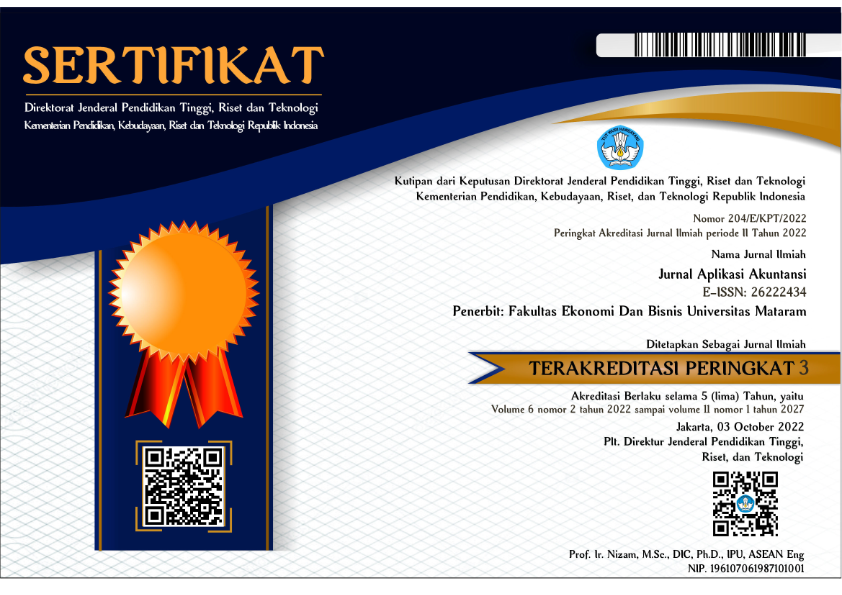The INVESTIGATION OF TAX DISPUTE IN INDONESIA
DOI:
https://doi.org/10.29303/jaa.v4i1.66Keywords:
tax avoidance, tax dispute, tax law, Supreme Court�s verdictAbstract
The study was aimed to examine the cases of tax dispute in Indonesia. This study will be identified the behavior of verdicts of the Supreme Court, especially indications of tax avoidance by taxpayer and identify the governments loss due to tax avoidance. The data use the verdicts of the Supreme Court regarding to tax disputes in the Supreme Court. Using logistic regression, this study revealed that taxpayer was facilitated to commit tax avoidance by the legal loopholes. The motivation of taxpayers in committing tax avoidance was to utilize the time during the dispute process in accordance to postpone the taxes payment. Delaying tax payment by applying the dispute, taxpayer get benefit from time value of money. From the analysis was, the Indonesian tax laws, some how, provides opportunities for taxpayers to perform tax avoidance. Moreover, the study showed that the tax laws have not been implemented properly. Accordingly, the loss opportunity cost of the government due to tax avoidance by the taxpayers was approximately 10 billion rupiah. Therefore, based on the result of the study, we advised the government of Indonesia to do some policies, which are: 1) describe the legislation and taxation system with an objective definition; 2) designing administrative processes that can detect the tax avoidance, which is more stringent administrative processes; 3) shorten the processing of a tax dispute.
References
Act Number 16 Year 2000 concerning the Second Revision on Act Number 6 Year 1983 concerning General Provisions and Tax Procedures.
Act Number 28 Year 2007 concerning the Third Revision on Act Number 6 Year 1983 concerning General Provisions and Tax Procedures.
Act Number 6 Year 1983 concerning General Provisions and Tax Procedures.
Aidt, Toke S. (2003). Review: Economic Analysis of Corruption: A Survey, The Economic Journal. 113(491): F632-F652.
Alm, James, Bahl, Roy and Murray, Matthew N. (1990). Tax Structure and Tax Compliance, The Review of Economics and Statistics. 72(4): 603-613.
Angell, Montgomery B. (1938). Tax Evasion and Tax Avoidance, Columbia Law Review. 38(1): 80-97.
Baiman, S. (1982). Agency Research In Managerial Accounting: a survey, Journal of Accounting Literature. 1: 154�213.
Becker, G.S. (1968). Crime and Punishment: an Economic Approach, Journal of Political Economy. 70:1-13.
Benneth, D. Scott. (1998). Integrating and Testing Models of Rivalry Duration, American Journal of Political Science. 42(4): 1200-1232.
Cai, Hongbin and Liu, Qiao. (2009). Competition and Corporate Tax Avoidance: Evidence From Chinese Industrial Firm. The Economic Journal. 119(April): 764�795.
Casey, Jeff T. and Scholz, John T. (1991). Beyond Deterrence: Behavioral Decision Theory and Tax Compliance. Law and Society Review. 25(4): 821-844.
Desai, M. (2005). The Degradation of Reported Corporate Profits. Journal of Economic Perspectives. 19(1): 171-192.
Desai, M and Dharmapala, D. (2006). Corporate Tax Avoidance and High Powered Incentives. Journal of Financial Economics. 79(1): 145-179.
Dwimulyani, Susi, 2010. Konservatisma Akuntansi dan Sengketa Pajak Penghasilan: Suatu Investigasi Empiris. Paper dipresentasikan di Simposium Nasional Akuntansi XIII, Universitas Jenderal Soedirman, Purwokerto.
Dwiputri, I.N. (2012). �Hidden Action in the Case of Tax Disputes in Indonesia�. Journal of Indonesian Economy and Business 27(3): 373-389.
Dyreng, Scott D., Hanlon, Michelle and Maydew, Edward L. (2008). Long-Run Corporate Tax Avoidance. The Accounting Review. 83(1): 61-82.
Dyreng, Scott D., Hanlon, Michelle and Maydew, Edward L. (2010). The Effects of Executives on Corporate Tax Avoidance. The Accounting Review. 85(4): 1163-1189.
Eisenhauer, Joseph G. (2006). Severity of Illness and the Welfare Effects of Moral Hazard. International Journal of Health Care Finance and Economics. 6(4): 290�299.
Gravelle, Jane G. (2009). Tax Havens: International Tax Avoidance and Evasion. National Tax Journal. LXII(4): 727-753.
Harberger, Arnold C. 1964. The Measurement of Waste. American Economic Review. 54(3): 58-76.
Harberger, Arnold C. (1954). Monopoly and Resource Allocation. American Economic Review. 44(2): 77-87.
Harberger, Arnold C. (1959). Using the Resources at Hand More Effectively. American Economic Review. 49(2): 134-146.
Hines Jr., James R. (1999). Three Sides of Harberger Triangles. Journal of Economic Perspectives. 13(2): 167-188
Jain, Anil Kumar. (1987). Tax Avoidance and Tax Evasion: The Indian Case. Modern Asian Studies. 21(2): 233-255.
Koch, Michael T. (2009). Governments, Partisanship, and Foreign Policy: The Case of Dispute Duration. Journal of Peace Research. 46(6): 799-817.
Krustev, Valentin L. (2006). Interdependence and the Duration of Militarized Conflicts. Journal of Peace Research. 43(3): 243-260.
La Brie, F.E. (1955). The Role of the Courts in Tax Avoidance. The University of Toronto Law Journal. 11(1): 128-138.
Omer, Thomas C and Yetman, Robert J. (2007). Tax Misreporting and Avoidance by Nonprofit Organizations. JATA. 29(1): 61-86.
Pudyatmoko, Y.Sri, (2009). Court and Dispute Resolution in the Field of Taxation [Pengadilan dan Penyelesaian Sengketa di Bidang Pajak]. Revision edition. Jakarta: PT Gramedia Pustaka Utama.
Rice, Ralph S. (1953). Judicial Techniques in Combating Tax Avoidance. Michigan Law Review. 51(7): 1021-1052.
Schwarz, Peter. (2009). Tax-Avoidance Strategies of American Multinationals: An Empirical Analysis. Managerial and Decision Economics. 30: 539-549.
Silverstone, Howard, and Sheetz, Michael., 2007. Forensic Accounting and Fraud Investigation for Non-Experts. 2nd Edition. John Wiley & Sons, Inc., Hoboken, New Jersey.
Slemrod, J. (1992). Did the Tax Reform Act of 1986 Simplify Tax Matters? Journal of Economic Perspectives. 6(1): 45-57.
Steenkamp, Lee-Ann. (2012). Combating Impermissible Tax Avoidance through Efficient Administrative Aproach: what SARS can learn from its Canadian counterpart. the Comparative and International Law Journal of Southern Africa. 45(2): 227-257.
Stiglitz, Joseph E. (1985). The General Theory of Tax Avoidance. National Tax Journal. 38(3): 325-337.
Tsebelis, G. (1989). The Abuse of Probability in Political Analysis: The Robinson Crusoe Fallacy. The American Political Science Review. 83: 77-91.
Tsebelis, G. (1990). Penalty Has No Impact on Crime? A Game Theoretical Analysis. Rationality and Society. 2: 225-286.
Tsebelis, G. (1993). Penalty and Crime: Further Theoretical Consideration and Empirical Evidence. Journal of Theoretical Politics. 5: 349-374.









